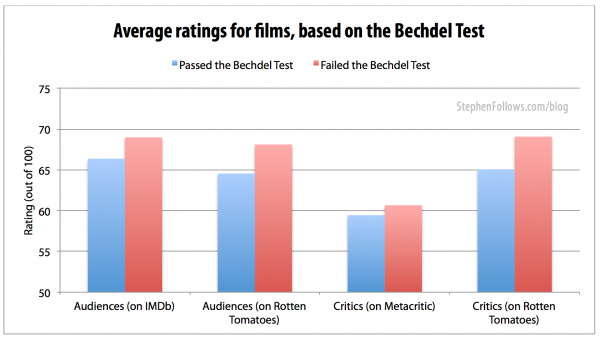How good are movies which pass the Bechdel Test?
I should start this article with a personal note – I don’t like what I’ve found. I always try to approach data impartially and not look for certain results. Inevitably, this sometimes leads to results which challenge my beliefs or my opinions. I am a firm believer that the representation of women on screen is often woefully poor and needs addressing.
Last week the guys at FiveThirtyEight published a great analysis of the box office performance of films which pass the Bechdel Test. My first thought was ‘damn’ as I have also been working on a similar study. They have been extremely thorough and it’s well worth reading their article. In order to avoid repeating their work I have shifted my research to look at how good the films that pass the Bechdel test are.

First, a quick primer for those who don’t know what the Bechdel Test is. It was suggested in 1985 by Alison Bechdel in her comic strip Dykes to Watch Out For. A film passes the Bechdel Test if it features…
...at least two named female characters…
…who talk to each other…
…about something other than a man.
Using data from IMDb, Rotten Tomatoes, Metacritic and bechdeltest.com I studied 4,983 films made in the past 120 years. In summary…
Films which fail the Bechdel Test get higher ratings from both audiences and film critics.
Films which fail all three criteria of the Bechdel Test (i.e. fewer than two named female characters) get the highest ratings
The results
By all four measures, films that fail the Bechdel Test score higher than those that pass.

Reasons for failing the Bechdel Test
When we break down the results we see that the highest rated films are those which feature fewer than two named female characters.

Why is this?
Honestly, I don’t know. Here are a few personal theories…
The most established filmmakers are male and therefore more likely to make male-orientated stories. (If you take a look at the top rated films of the past two decades you’ll see that a vast majority of those films fail the Bechdel Test).
Overall, the roles given to women are so poor that audiences and critics would prefer there to be no women, than cliched or superficial characters.
Through years of watching the same kinds of films we subliminally expect women to have subservient roles and don’t like it when they, you know, have a name and talk.
If you have any suggestions please leave a comment below and I’ll add them to the list above.
Limitations
The Bechdel Test is not a scientifically significant test. It doesn’t really prove anything about how ‘sexist’ a film is. However, it is such an unbelievably low bar for films to cross that the fact many films don’t pass it is shocking. In an ideal world we would have a better measure for how women are represented in films.
There are some films for which the Bechdel Test doesn’t really apply. In my detailed analysis I faced tricky questions when looking at animations, films featuring cross-dressing (such as films by Tyler Perry) and semi-documentary film (such as Jackass Presents Bad Grandpa).
For the most part, I did not assess which films pass the Bechdel Test myself so I am relying on data reported by others. This always makes me nervous as I cannot tell what bias or filters will be carried over into my work.
Some of the ratings on bechdeltest.com are disputed by other users.
I chose to exclude films which had fewer than 50 user ratings on IMDb.
I have mentioned a few times that audience and critics ratings measure how ‘good’ a film is. This is a tricky topic as it’s clearly impossible to objectively measure art. However, I would contend that the next best methods (I.e. awards and box office) are more open to manipulation than ratings.
Detailed analysis for 2011-2013
This topic has an inherent bias, in that we only know if a film passes the Bechdel Test if someone has taken the time to view it and report the result. In order for my results to have any scientific basis I would need to be looking at an impartial subset of films, not just those which have been reviewed on bechdeltest.com. The 5,000-odd films on bechdeltest.com have been selected purely on the basis that the reviewer wanted to watch them. In order to address this possible bias I looked in more detail at the top 100 films from 2011, 2012 and 2013 (300 films in total). The results were broadly the same, albeit less pronounced. This leads me to suggest that the trend is still applicable to recent films.
Further Reading

I have looked at gender within the film business a few times. You might enjoy these previous articles...


